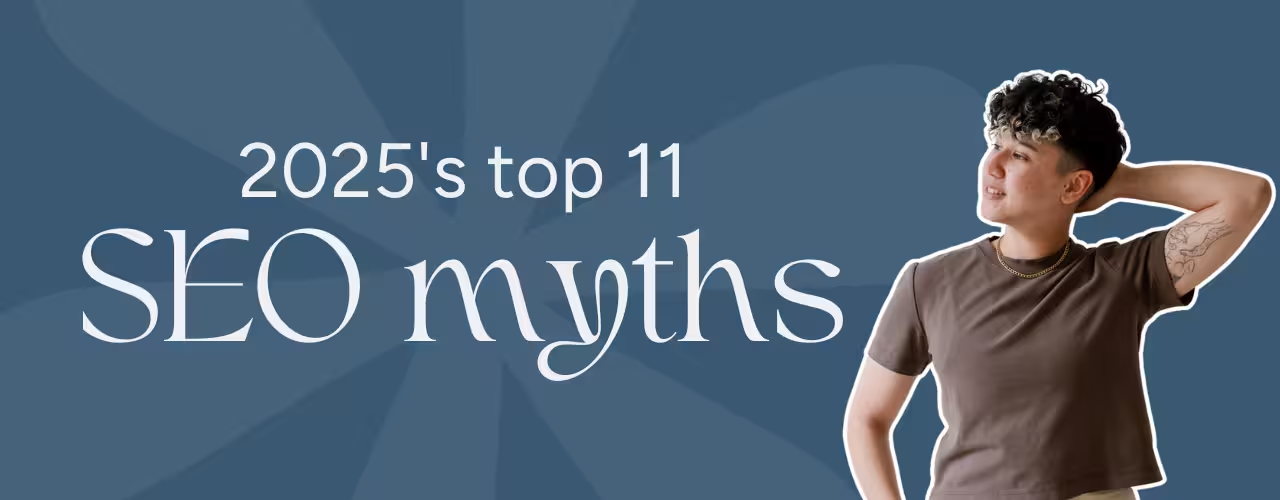Last updated: 06 May 2025 Estimated reading time: 16 minutes
Think SEO is dead?
Think you can “fix” it once and never touch it again?
Think AI is about to wipe out the entire SEO industry?
You’re not alone — but you’re also not right.
In 2025, outdated SEO myths are still everywhere. Some are harmless. Most are silently costing small businesses visibility, traffic, and leads.
As someone who’s lived through the chaos — and helped clients unlearn terrible advice — I’m here to walk you through what actually matters now.
Let’s bust some myths 🔥
Myth 1: The more keywords, the better.
In SEO, keywords play a huge role in giving you the results you want. Choosing and using the right keywords helps search engines understand what your content is about. When they do, they’ll be able to match it with what people are searching for.
Let’s say your small business is about selling flowers and you usually use keywords like “best flower shops for weddings,” search engines would see your website as relevant to that specific search.
One of the most common SEO misconceptions that newbies tend to fall into is to think that the more keywords they put in their content, it’s better. But this “keyword stuffing” actually hurts your rankings rather than helps you.
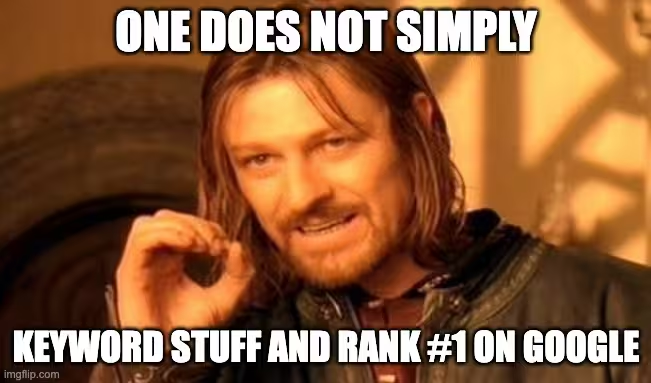
The SEO truth: Quality over quantity
The thing about search engines today is that they can understand context and relevance pretty well. This means that when you repeat the exact phrases over and over again in your copies without providing relevant information, then search engines would rank your content lower in terms of relevance and usefulness.
You must realize that search engines want to show users the most helpful content and not the content that repeats phrases many times. Quality always beats quantity when it comes to keywords. So, focus on answering questions your audience is asking. Write with the intention of informing your audiences and you’ll usually end up with the right keyword balance for your content without trying too hard.
Myth 2: More backlinks mean higher rankings.
One way to improve your rankings is through building backlinks. These links come from other websites that redirect audiences to yours. It’s easy to think that when you collect as many backlinks as possible, then it will shoot you to the top of the search results—but this is a common SEO mistake.
The SEO truth: Backlink quality
Just like in choosing keywords, the quality of backlinks matters much more than the quantity. One link from a trusted, relevant, and high-quality website in your industry can be worth more than hundreds of links from random low-quality sites. Search engines look at who’s linking to you, not just how many sites are linking to you. They want to see that respected and trusted voices in your field find your content valuable enough to share.
But it doesn’t stop there. The context of those backlinks matters too! Are they coming from content related to your business? Do they make sense naturally within the content? These factors—and many others—contribute to how search engines see those backlinks.

So, if you want to improve your SEO, don’t think about building a mountain of low-quality backlinks because this can actually harm your website. Good and natural link-building takes time. This would only happen if you create good, valuable, and informative content that other site owners want to reference. This might be slower but in SEO slow and steady wins the race.
Myth 3: Meta description character count must be perfect or your SEO will tank.
Crafting strong meta descriptions is essential for SEO success — they directly influence click-through rates by helping users decide to visit your site. However, obsessing over hitting an exact 150–160 character count isn’t the key to winning SEO.
The SEO truth: No need to obsess
Google often rewrites meta descriptions dynamically based on the user’s search query — studies show this happens over 70% of the time. While keeping meta descriptions within a recommended range makes them easier for Google to display neatly, the true priority is writing clear, relevant, and click-worthy descriptions that match search intent.
In a past project, a client asked me to edit one of their meta descriptions, which slightly exceeded the 160-character guideline. I explained that what matters most is having a strong, compelling meta description that encourages clicks — not strict character math. As an SEO strategist, my job is to create descriptions that give both users and search engines a clear, optimized signal — whether that takes 145 characters or 165.
Myth 4: You only need to optimize once.
Some business owners think SEO is a one-time, big-time thing. They do it once and think they’re done for good. But SEO isn’t a one-and-done project you can check off your list.
The SEO truth: SEO is an ongoing process
The reality is that SEO needs regular attention to keep things growing well. Search engines change their algorithms hundreds of times each year. Most updates are small tweaks, but sometimes they make major changes that can hugely affect your rankings. So, what might have worked perfectly last year when you started might not have worked the same way today. Staying on top of these changes helps you adjust your strategy efficiently.
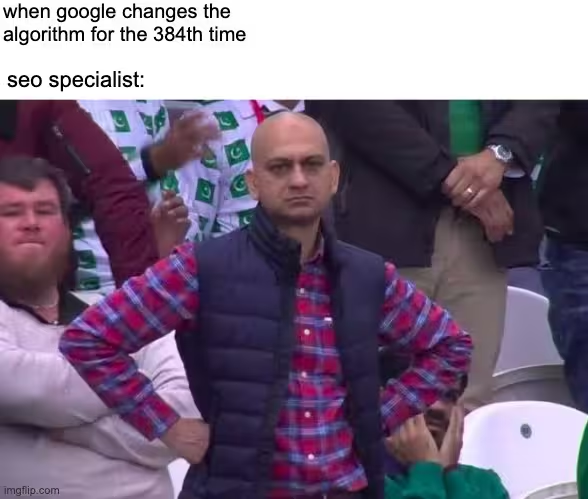
Plus, your own business isn’t static either. You launch new products, update your services, or expand to new markets. Each change you make in your business should be reflected in your SEO strategy. New products or services mean new keywords to target and new content to create. Search engines favor sites that are active and updating their content regularly. This is also the same for service-based businesses like therapy or pet sitting, where your content needs to feel relatable and stay fresh.
Regular checkups on your SEO performance help you spot problems early. Maybe your page speed has slowed down or the bounce rate has increased. Finding and fixing these issues quickly prevents bigger problems later on.
Myth 5: Updating alt text alone will fix my SEO rankings.
Alt text is absolutely important for SEO — it improves accessibility, helps search engines understand images, and can give your pages a small boost in certain contexts. But it’s not a magic bullet.
The SEO truth: SEO is multifactorial
If your website content never changes, and you’re up against competitors (or in the case of the following story, even fictional characters) who constantly publish fresh, dynamic content, tweaking a few image alt tags won’t move the needle. SEO growth requires a steady stream of relevant, updated, and valuable content — not just polishing around the edges.
One client, a talented photographer, was struggling to gain visibility for his portfolio website. He kept suggesting we simply “update the alt text” on his 37 existing photos to outrank a popular TV show character who shared his name.
I had to explain: While alt text helps, it’s no match for the constant flood of new, high-authority content that the television series was generating every week.
No amount of alt text polishing could compete without a broader SEO strategy that included fresh content, link building, and audience engagement. SEO, among other things, is about staying active, relevant, and visible over time.

Myth 6: Longer content is better
You’ve probably heard that longer articles rank better in search results. And while there’s truth to this, simply making content longer doesn’t automatically improve rankings.
The SEO truth: Avoid fluff
What really matters is whether your content satisfies the searcher’s intent. Sometimes a short, direct answer is what your target audience wants. For example, if someone searches “how to perfectly boil an egg,” they don’t need a 5,000-word blog post. That’s not something a normal person would look for. What they’re looking for are clear instructions they can follow quickly. Making content insanely long in this case could actually hurt the user experience.
Also, don’t even think that you can spit out words just to increase your word count. This can totally backfire because readers can tell when you’re just padding your content with fluff. With this, your bounce rates—or the number of users who just check one page of your site without engaging with other pages—would go up. Search engines track these user behaviors and when they realize your content isn’t relevant or helpful, they’ll demote your content.

So, why do longer pieces often rank better? It’s not because they have more words but because they cover topics in depth, answer related questions, and provide value to users.
The type of business you’re in also plays a role here. For example, if you’re in the legal field, Google is extra careful and checks your content more closely to make sure the information is accurate. I saw this firsthand when I worked with Pepitone Law during an SEO audit. They were already doing a great job creating relevant and personal content, so I mainly focused on improving the technical side to give their site a boost.
Myth 7: SEO is too technical for small businesses
One of the many SEO myths for small businesses is to think that SEO isn’t for small businesses. Many small business owners feel intimidated by SEO. They’d see complicated terminology, hear about algorithm updates, and they’d think they need to be an SEO expert to make any progress.
The SEO truth: SEO can be accessible
But the truth is: the fundamentals of good SEO are accessible to anyone who’s willing to learn the basics.
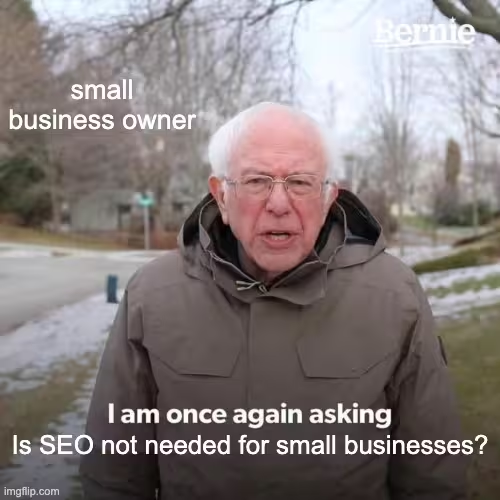
Besides doing SEO, it’s a good idea to set up a Google Business Profile for your small business. It helps more people find you online. When you’re just starting out, your first customers will likely come from nearby, and a Google Business Profile makes it easier for them to see what you do and how you can help.
Besides, many user-friendly tools can help small businesses with SEO basics. Content Management Systems (CMS) like WordPress offer extensive plugins that provide help with the basic SEO aspects. Google also has free tools that provide insights about your site’s performance and suggestions for improvements.
But of course, the technical side of SEO really matters. And it’s okay to get help if it gets too overwhelming. You don’t need to become an SEO expert, just understanding the basic concepts will help you make informed decisions about where to invest your resources.
Myth 8: SEO drives immediate results
One of the biggest SEO misconceptions about SEO is the timeline. They’ll ask, “How long does SEO take for you to see your website on Google?” Many expect to see dramatic changes within days or weeks after making SEO efforts.
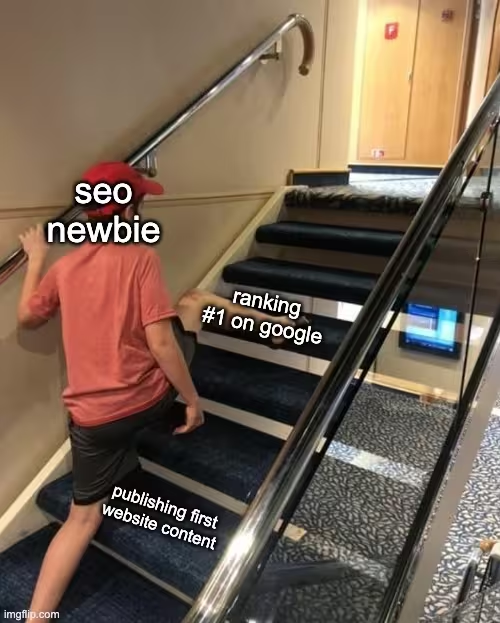
The SEO truth: Slow and steady wins the race
Here’s the thing: SEO is a long-term strategy.
A part of improving your SEO is establishing your credibility—and this also takes time. Building authority in your industry happens gradually as you consistently publish valuable content. The more you publish valuable and trustworthy content, then the higher the chances that other websites recognize you and earn quality backlinks.
In SEO, patience pays off. One client, right after we launched their brand-new therapy website, was frustrated they couldn’t already find themselves on page one of Google. “I need my website to be seen now,” they told me. I gently reminded them: you just launched. The site was fully indexed, technically sound, and strategically optimized—but they were in an ultra-competitive niche in NYC. The website was the first step. Now comes the part that actually builds authority: consistent content, time, and trust signals.
Businesses that stick with sound SEO strategies for the long haul typically outperform those jumping between quick fixes. Building a solid foundation takes time, but it creates more stable and lasting results.
Myth 9: AI will replace SEO
Artificial Intelligence (AI) has really boomed in the last couple of years. Some folks think AI will make SEO obsolete. They think that algorithms would automatically determine rankings without any need for optimization. But honestly, this view misunderstands both AI and SEO.
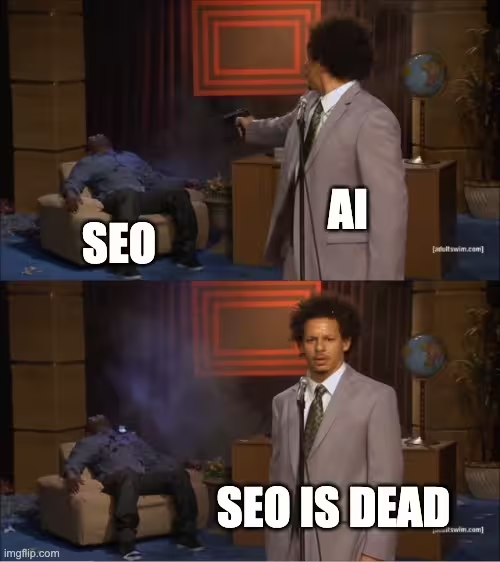
The SEO truth: So long as there are search engines, SEO will exist
Search engines already use AI to understand content and user intent. Google’s algorithms have gotten smarter at recognizing natural language and delivering relevant results. But these changes don’t eliminate the need for SEO. Rather, they just change what good SEO looks like.
With the rise of AI, the quality of your content has become more important. Search engines can now distinguish between shallow content and truly helpful information. They can recognize if your content satisfies search intent or if you’re barely spitting out senseless words. This means creating genuinely useful content is now a bigger part of SEO success.
Even though AI has developed immensely, human insight remains to be irreplaceable. AI tools can help you research keywords or generate content ideas, but they can’t fully understand your specific business goals or customer relationships. It can’t make strategic decisions about which markets to target or how to position your brand against your competitors. These human elements of SEO strategy will always need… you guessed it right… humans.
AI is changing SEO—not replacing it. The smart move is to combine the powers of AI and your creativity and judgment to follow through with your SEO strategy. This partnership between humans and AI represents the future of SEO.
Myth 10: Any CMS works fine for SEO
It’s easy to build your website nowadays. There are so many CMSs that can help you create your business website in a matter of minutes. But what they don’t know is that the CMS you choose can affect your SEO results.
The SEO truth: Not all CMSs are created equal
Some CMSs come with built-in SEO features that would help you generate clean URLs, and site structures, and make it easy to add title tags and meta descriptions. Some even offer an extensive environment of plugins to aid you with your SEO needs.

But some CMSs are infamous for creating cryptic codes for images and have limited SEO controls and functions. The difference of this alone could greatly affect your rankings and would save you extra hours of work manually adding or erasing SEO elements you want.
I once had a client who was using Wix, a really limiting CMS, that just didn’t give their business the flexibility it needed to grow. I explained how switching to something more powerful—like WordPress—could make things so much easier, but they decided to stick with what they had. In the end, we spent way more time and effort fixing issues that a better CMS could’ve handled from the start.
Conversely, I’ve worked with clients who have used Squarespace or Framer and found that, while these platforms can definitely improve some SEO features, they’re completely acceptable as an SEO-friendly CMS.
Myth 11: Paid ads boost organic SEO
Another SEO misconception people think is that paying for ads like Google Ads helps your organic search rankings—the place of the website in unpaid search engine results.. But this isn’t exactly true. Google keeps these systems completely separate.
The SEO truth: It’s all about strategy
Paying for ads won’t move your website up in the organic search results. Think about it… If ad spending affected rankings, rich companies would just find their way to the top of all searches.
But paid ads and SEO can still work together in other ways. Ads give you additional visibility while you’re building organic rankings and they help you show up in more places on the search results page. Paid ads can also boost your brand awareness which might lead to more people searching for your name online.
The best approach uses both paid and organic strategies together. But this is costly and doing the former doesn’t directly boost the latter.

Frequently asked questions about SEO in 2025
Absolutely. SEO continues to drive organic visibility and brand growth, especially for small businesses. The rules have changed — but the need to show up where customers search hasn’t.
No. AI tools can assist with content creation, but true SEO strategy requires human judgment, personalization, and technical setup — things AI still can’t replicate fully.
Yes — but it’s about keyword intent and placement, not stuffing pages with keywords. Context and content quality are what win rankings now.
No. Google now prioritizes helpful, concise, and targeted content over sheer length. A well-written 800-word article can outrank a bloated 3,000-word piece easily.
You can, to a degree — but these platforms often limit advanced SEO customizations. For long-term growth, CMS flexibility like WordPress or Webflow is better.
Not exactly. Google usually filters duplicate content rather than punishing it. Unique, original pages still perform best.
No. PPC (paid search) and SEO (organic search) operate separately. Running ads might bring immediate traffic but doesn’t directly affect your organic rankings.
Yes! Even service providers without storefronts benefit from local SEO because Google still ranks businesses based on proximity and relevance.
Yes. A bad CMS can slow your site, limit indexing, and block key SEO improvements — all without you even realizing it.
Get helpful SEO insights for your small business

Running a small business and trying to handle SEO at the same time can feel like a lot—especially with all the myths out there. That’s why we at Marketing by Rocio offer clear, honest SEO services to help you reach your business goals.
Got SEO questions? Reach out and we’re here to help!

